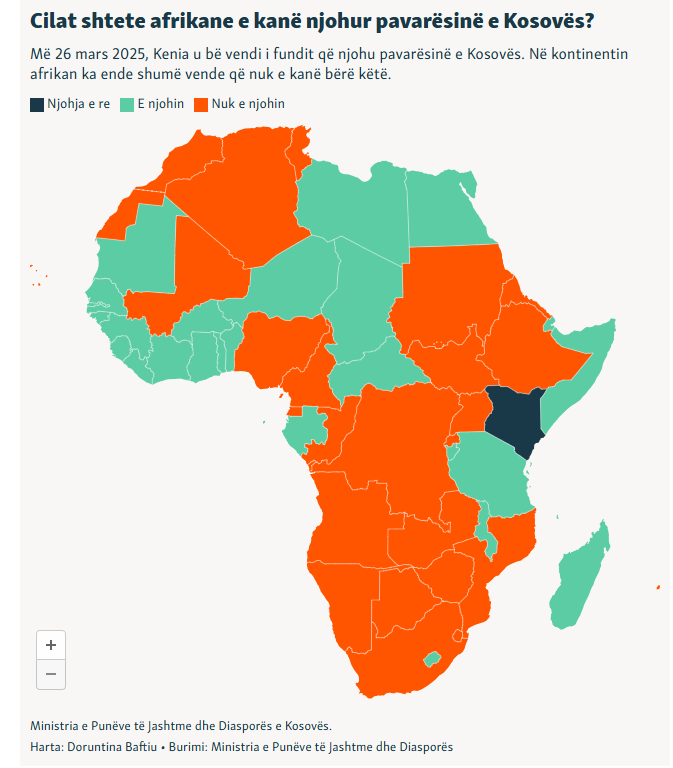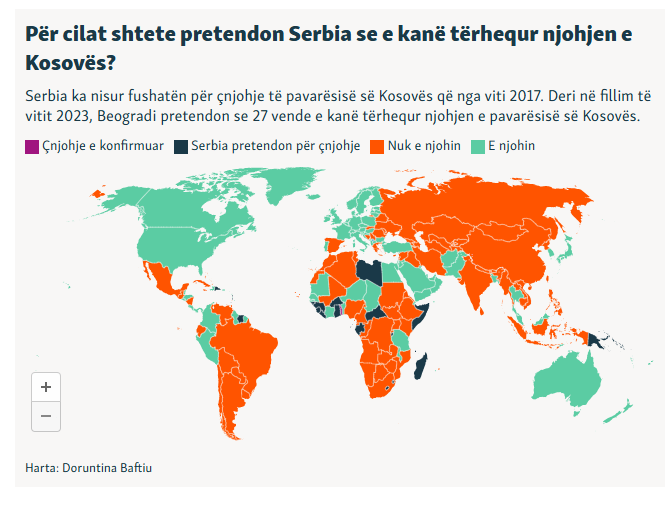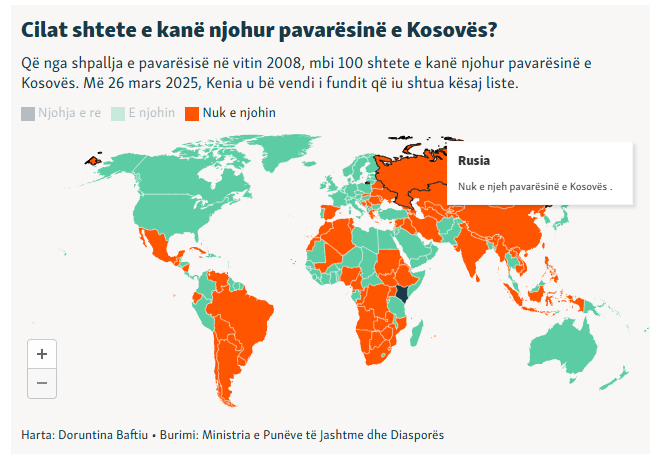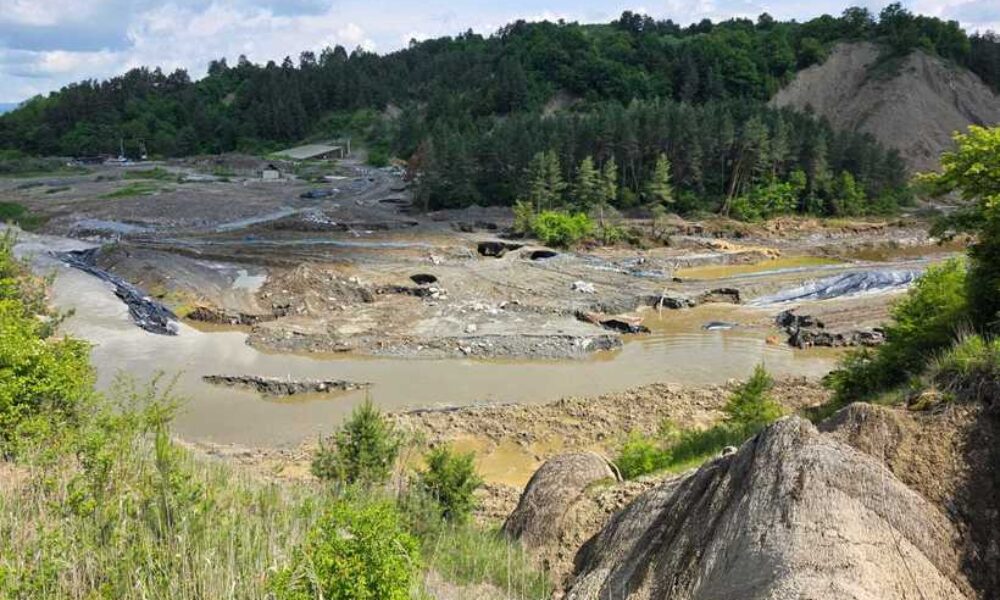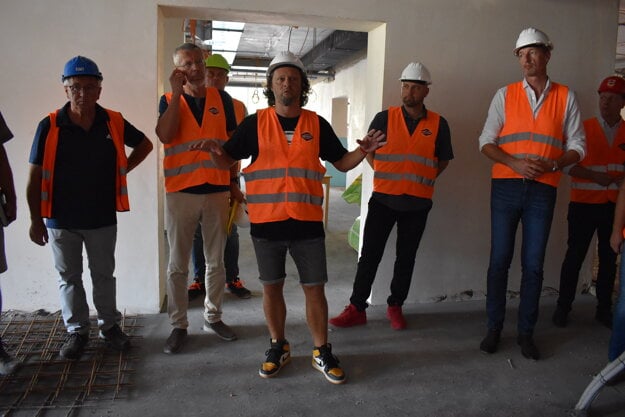Why does the recognition of the state of Kosovo matter?

-Botted on the Radio « Free Europe »-
As a state with considerable power in East Africa, Kosovo’s recognition of Kenya caused widespread reactions in Kosovo and Serbia. Leaders of the two countries showed hopes and concerns about the possible impact that expert Gëzim Visoka describes as a « turning point »
Since the declaration of Kosovo’s independence, many states have recognized its citizenship. But many others, as in the African continent, still refuse to do so because of concerns about separatist movements within their states.
Since the first meeting held by the African Union (AI) this month, Morocco – leading the presidency of this institution for March – called for the protection of « territorial integrity » as a way to maintain stability in the continent.
Kenya recognition can bring about a change of this policy, encouraging that other African states make the same decision.
Gëzim Visoka, author of the book « Recognition of States », says that, if institutions engage, this may be a « turning point in Kosovo’s favor ».
« Kenya’s recognition is a good opportunity for the Government of Kosovo, but also for other actors engaged, to restore momentum and work sustainably and strategic to conclude the process of international recognition of Kosovo, » Visoka told Radio Free Europe.
Visoka, a professor of study of peace and conflict at the University of Dublin in Ireland, says, in the future, Kosovo should aim for 10 to 12 recognitions within the year.
Serbian President Aleksandar Vucic said Kenya’s recognition could foster a trend of Kosovo’s recognition.
He said he will, personally, talk to East African leaders to prevent « the spread of the trend (recognition of Kosovo) ».
He also warned that in the next two weeks there will be withdrawal of recognition of Kosovo’s independence from two African countries, but did not specify them.
Even in the past, Serbia has announced to withdraw recognition from countries such as Surinami, Burundi, Liberia, Solomon Islands, Madagascar, Ghana and others.
Most of the countries that Serbia claims have withdrawn recognition are from Africa.
Visoka, earlier, had described the recognition of Kosovo’s independence as « disordered acts » that do not make sense in the case of Kosovo, as the reasons mentioned in initial recognition-such as the 2010 finding of the International Court of Justice that Kosovo’s independence did not violate international law-have not changed.
« In most cases, the recognitions occur from states that are mainly post-colonial countries, without long diplomatic traditions and are known for variable foreign policy, which are changed depending on financial, economic, even military assistance from regional or international powers, » Visoka said.
Kosovo’s Ministry of Foreign Affairs and Diaspora (MFA) has accused Serbia of pressure on states of not knowing or withdrawing recognition of Kosovo’s independence.
According to her, Serbia is ignoring the commitments of the road to normalization, the parties reached in Ohrid in 2023, through « refusing to recognize Kosovo and distorting international legal principles ».
Why has Kenya recognition promoted?
In addition to the hope of Kosovo and the fear of Serbia that Kenya’s recognition can launch a new trend of recognition, Kenya’s recognition in particular matters. For African states that have recognized Kosovo’s independence so far, Kenya is the second gross state of domestic production after Egypt.
Following the officialization of Kenya’s recognition, the President of Kosovo, Vjosa Osmani, said that during a meeting with Kenya President William Ruto, they also discussed « opportunities for deepening cooperation in trade, education, tourism and other areas of common interest ».
« Both of our countries are committed to opening diplomatic missions as a concrete step towards a strong and sustainable partnership, » Osmani wrote on X.
So far, Kenya’s role in the Balkans has been limited to the United Nations peacekeeping missions.
But in Africa, and especially in East Africa, this state enjoys an important role as regional power, through participation in various projects, such as electric highways with Ethiopia and East African Energy Network.
Kenya is also a founding member of the East African Community (EAC), the chairmanship of which President Ruto now enjoys.
She has also played a key role in the intermediation of conflicts within the region.
For example, on March 28, Kenya sent former Prime Minister Riaila Odinga to South Sudan, with the aim of preventing the return of the civil war.
Why don’t Kosovo know more states?
Since 2008, Kosovo has provided recognition of nearly 120 countries. In recent years, the MoJD has been criticized by opposition and policy experts for non-recognition for new recognition.
Visoka says there are many reasons why Kosovo has not provided more recognition. Among them are the main « shift of Kosovo’s foreign policy priorities » and « Serbia’s proactive diplomatic campaign to prevent and, where possible, to withdraw Kosovo’s recognition ».
According to him, the Washington Agreement, signed on September 4, 2021, also had an impact, when Kosovo agreed to respect a one -year moratorium through which it would not apply for membership in international organizations.
« This has created the international impression that Kosovo is no longer interested in new recognition, or that the path to recognition must go through the EU-mediated dialogue to normalize relations with Serbia, » says Visoka.
The Washington Agreement also obliged Serbia to suspend its initiative to persuade various states of the world to withdraw recognition of Kosovo’s independence.
US President Donald Trump, Kosovo Prime Minister Avdullah Hoti and Serbian President Aleksandar Vucic during the signing of the White House agreement, September 2020
Visoka says many states fear that the recognition process can have destabilizing effects and undermined their interests, « therefore tend to preserve existing international order and give priority to territorial integrity to the right to self -determination. »
But, according to him, this can change if the state seeking recognition, like Kosovo, engages « with proactive diplomacy » and « cooperates closely with its allies in the world ».
Doruntina Baftiu

